Dentures Goodyear
Get the Gaps in Your Smile Filled
When you suffer from tooth loss, it’s easy to feel down in the dumps. After all, the condition harms both your looks and oral health. It’ll inevitably lower your quality of life if left unaddressed. Still, you don’t have to let missing teeth get the better of you. Dentures in Goodyear can quickly and effectively restore your full smile! At Goodman Dental, these prostheses will make your grin gorgeous again. To learn about their features, just keep reading or book a consultation with us by calling our office today.
Why Choose Goodman Dental for Dentures?
- Multiple Payment Options Available for Dental Patients
- Dentist Produces Natural-Looking Prostheses for Patients in Need
- Traditional & Implant Denture Options Available
Who Is a Good Candidate for Dentures?

As you’d expect, ideal denture candidates feel the effects of missing teeth. They will, for instance, likely be too embarrassed to smile in front of others. Similarly, these prospects often struggle to eat or even speak properly.
Even so, the best way to confirm candidacy is by seeing Dr. Goodman in person. He’ll assess your oral health to see if dentures suit you. If he approves, he and the rest of our team will draft a treatment plan tailored to your needs.
All that said, not every patient who’s missing teeth may want dentures. Another procedure – a dental bridge, perhaps - could be better for those lacking only a tooth or two.
Types of Dentures
As part of the consultation, Dr. Goodman will help you learn how denture treatment works. In particular, he’ll see which kind of denture best meets your needs. You can expect him to suggest one of the three types below:
Partial Dentures
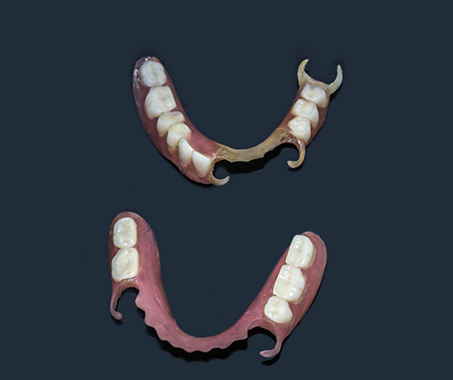
A partial denture only replaces a few pearly whites. Given that fact, it clasps onto surrounding teeth to secure itself. Some of your teeth must be shaped to handle this restoration.
All partial dentures consist of artificial teeth and acrylic, gum-colored bases. By filling gaps, they help prevent other teeth from tilting.
Full Dentures

A full denture, per its name, replaces an entire arch of teeth. Unlike a partial, it stays in place with natural suction instead of clasps.
The components of full dentures don’t differ much from partials. They, too, include gum-colored bases. However, a full denture is known for sitting snugly on the gums.
Implant Dentures
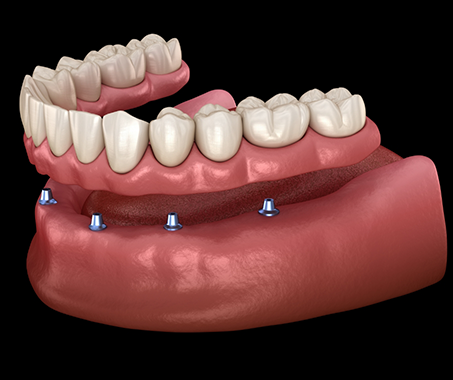
If you’d prefer a more stable and permanent option, you should consider implant dentures.
In contrast to others, implant dentures attach to dental implants — posts surgically placed into the jawbone. These implant posts slowly fuse with your jaw, working to maintain its bone tissue. As such, they’re permanent, don’t slip, and keep your jawbone strong.
The Benefits of Dentures
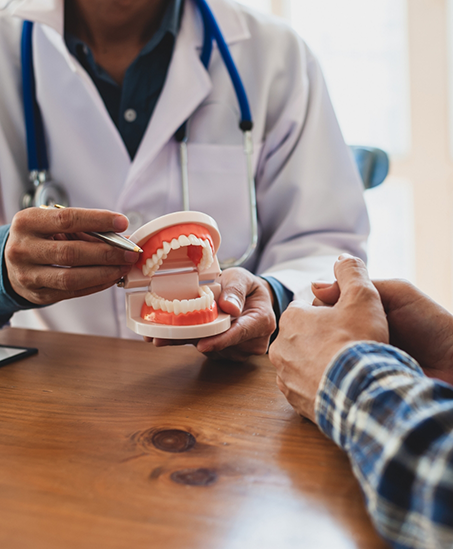
Should you get dentures, you’ll receive many great benefits. The most common of these are:
- Lifelike Results – Today’s dentures look very natural due to advanced technology. Therefore, they’ll make your smile look beautiful and blend with it seamlessly.
- A Confident Attitude – By filling your smile gaps and cheeks, dentures help you feel confident in your looks.
- Easier Eating – Dentures act as substitute teeth, so they’ll help you chew and eat food more easily.
- Long-Lasting Effects – If you give them proper care, dentures can last for many years.
Understanding the Cost of Dentures

Dentures are one of the most affordable methods of replacing teeth, but the customization required means it can be hard to determine what yours will cost until we meet you. When you come to us for a consultation, we’ll provide you with a complete estimate of what your new smile will cost, as well as options that may make it more affordable. Here’s what you should know about the price of dentures until then.
Factors That Affect the Cost of Dentures
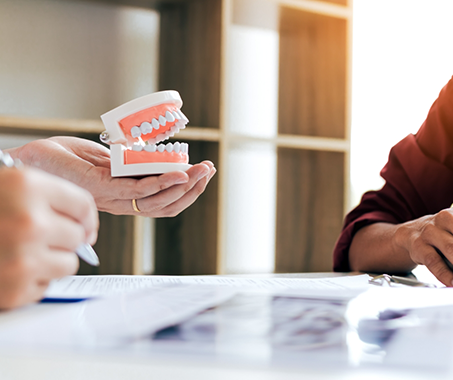
The cost of dentures depends on several key factors. First, any preparation needed beforehand, like extractions, can increase costs. Second, the type of acrylic used for the denture base can impact pricing; higher-quality materials tend to match your gum color better and last longer. Finally, the replacement teeth, made of acrylic or porcelain, should be durable and realistic. Cheaper dentures may use lower-quality materials, which can compromise their appearance and longevity. It's crucial to invest in quality since these will be in your mouth daily!
Are Implant Dentures More Expensive?
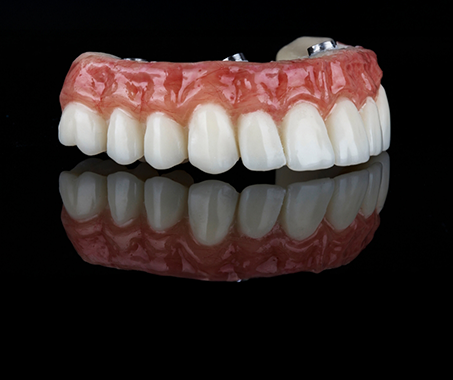
Yes, implant dentures are generally more expensive than traditional ones. This is because implant dentures require surgery to place titanium posts, which act as anchors for the dentures. The process involves higher material costs (such as titanium implants), additional procedures (like bone grafting if necessary), and longer treatment times. However, implant dentures tend to be more stable, comfortable, and long-lasting compared to traditional prostheses. While the upfront cost is higher, they can offer a more natural feel and better overall function in the long run.
Does Dental Insurance Cover Dentures?

We are in-network with Delta Dental Premier and accept all PPO dental insurance plans. When using your insurance to help cover the cost of your dentures, you will likely receive partial coverage for this type of restorative care. Our team will be more than happy to review your plan and determine how to maximize your available coverage. We'll also take care of filing all necessary claims and paperwork to make the process easier and more stress-free for you.
Other Options for Making Dentures Affordable
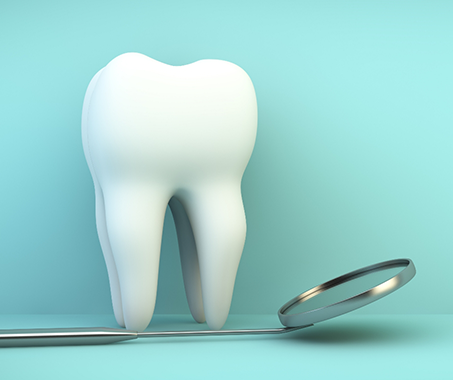
Ideally, we want all of our patients to have a complete smile. That’s why we do what we can to connect you with services that may make the care you receive from us more affordable.
We frequently work with the financing firm CareCredit, which can allow you to split the cost of your dentures across several monthly payments. Patients who qualify may even be able to take advantage of low-to-no-interest financing terms.
If you have any questions about how you can make the services you receive from us more affordable, reach out to us for a consultation today!
Denture FAQs
Do Dentures Break Easily?
While dentures are incredibly durable, they are not indestructible. While a set can last between five and seven years with proper care and hygiene, an accident such as dropping a denture while cleaning, removing, or inserting the appliance can cause it to break. Dentures can also become broken or fractured due to a poor fit or tiny defects in their bases such as notches or scratches. Even if you give your dentures excellent care, they can still become worn down over time due to the stress of repeated use.
Can Dentures Become Ill-Fitting?
Since each set of dentures is customized to fit the patient’s mouth exactly, your appliance should fit incredibly well when you first get them. However, dentures can lose their fit over time because of wear and tear or the changing shape of the patient’s mouth (due to the atrophy of the jawbone that occurs after tooth loss). A poorly fitting pair of dentures can lead to a range of oral health issues such as sore and swollen gums, bad breath, bleeding gum tissue, and difficulty speaking. If your dentures don’t fit as well as they used to, contact our office in Goodyear so we can adjust or reline them, or replace them if necessary. Many patients find that denture adhesives help them keep their teeth in place between adjustments.
Can I Reline My Dentures Myself?
The rise of social media has led to the promotion of do-it-yourself denture relining methods. Many videos demonstrate how you can supposedly adjust your appliance on your own, and some stores even sell at-home denture reline kits. Unfortunately, it’s a terrible idea to reline your dentures. Only a qualified dentist has the training to repair an ill-fitting restoration and attempting to do the job yourself can cause injuries or further damage to your dentures. While there are many reasons why you should never attempt denture repair at home, one of them is that it is incredibly difficult to see what you’re doing when adjusting your appliance. DIY relining can also lead to issues like pain, difficulty chewing, and toxic materials like superglue being placed in the mouth.
Can I Sleep with My Dentures?
When you first get your dentures, you may be told to keep the appliance in your mouth for a full 24 hours including when sleeping, but after that, we recommend removing and setting them to soak every night before bed. Dentures restrict blood flow to your gums, which can lead to soft tissue irritation and bone loss in the jaw if you wear your appliance continuously. Removing your dentures for at least eight hours a day gives your mouth the time it needs to relax and clean itself. The space between your gums and your dentures is also the moist, warm, dark, and sheltered place where harmful oral bacteria need to thrive and multiply rapidly, and continuous denture use is associated with a higher risk of plaque accumulation, gum disease, and pneumonia.
How Long Will You Have to Wait to Get Dentures After Your Teeth Are Pulled?
Typically, the average waiting time for your new dentures is between six to eight weeks; however, the exact amount of time depends on the type of denture you need. This gives your gums a chance to heal and ensure that your dentures fit properly.
Immediate dentures (also known as same-day dentures) can be placed immediately following a tooth extraction, allowing you to speak and eat right away. However, Dr. Goodman will not have a chance to preview the fit first, and the shape of your underlying bone and gums could change as your mouth heals.
For implant dentures, you will need to wait between four and six months for the implant to fully integrate with the bone via osseointegration before the denture can be attached.
Can I Use Regular Toothpaste to Clean My Dentures?
While you should certainly brush and rinse your dentures daily, you should never use toothpaste to do it. Toothpaste is abrasive and can even leave microscopic scratches on the surface of your dentures, causing serious damage. For this reason, you should never use a hard-bristled toothbrush to clean your dentures; instead, opt for a soft-bristled brush.
To clean your dentures, use a mild dishwashing liquid, hand soap, or specialized denture cleanser, and be sure to take proper care of them after each meal.
Are Denture Adhesives Safe?
Yes, denture adhesives are safe on a limited basis or as prescribed by Dr. Goodman; however, be careful with products that contain zinc, as overusing denture adhesives with this ingredient can lead to health problems, including nerve damage.
Be sure to completely remove adhesive material at the end of each day so your denture can be thoroughly cleansed of bacteria. The FDA recommends the following:
- Follow the instructions provided with your denture adhesive
- Do not use more adhesive than recommended by the manufacturer
- Understand that all products may not list their ingredients
- Stop using denture adhesive if you experience extreme numbness or tingling
- Track your adhesive usage by monitoring it on a calendar
Should I Have All My Teeth Pulled to Get Dentures?
Repairing a damaged tooth is always preferable to replacing it, and Dr. Goodman will only recommend extractions if absolutely necessary. This might include when your tooth is too damaged to salvage due to extensive decay, severe infection, or serious trauma.
If all teeth in an arch are decayed or infected with gum disease, replacing them with dentures can be more affordable than repairing them with dental crowns. While there is no limit to the number of teeth that can be extracted in one visit, some extractions are more difficult than others.
Dr. Goodman will always explore all possible options before recommending a tooth be extracted.
